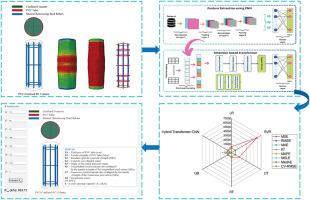基于深度学习的聚氯乙烯管约束混凝土柱在不同荷载偏心下的建模
IF 8
2区 计算机科学
Q1 AUTOMATION & CONTROL SYSTEMS
Engineering Applications of Artificial Intelligence
Pub Date : 2025-02-13
DOI:10.1016/j.engappai.2025.110217
引用次数: 0
摘要
本研究提出了一个基于深度学习的框架,用于预测聚氯乙烯(PVC)管约束混凝土柱在各种荷载条件下的承载能力。使用有限元建模生成了包含200个样本的综合数据集,其中包含PVC管厚度、混凝土强度和载荷偏心等关键参数。几种机器学习算法,包括线性回归(LR)、支持向量回归(SVR)、决策树(DT)、随机森林(RF)、梯度增强(GB),以及一种新的混合变压器-卷积神经网络(Transformer-CNN)模型,被用于预测任务。结果表明,本文提出的Transformer-CNN模型优于传统方法,其均方根误差最小为27.15 kN,决定系数最高为0.9875。利用交叉验证技术进一步验证了模型的鲁棒性,确保了模型在实际应用中的可靠性。为了促进可用性,开发了基于python的图形用户界面(GUI),使工程师能够在实际场景中有效地应用该模型。这项研究强调了深度学习在推进pvc约束混凝土柱设计和分析方面的潜力,提供了一种比传统方法更准确、更有效的替代方法。本文章由计算机程序翻译,如有差异,请以英文原文为准。

Deep learning-based modelling of polyvinyl chloride tube-confined concrete columns under different load eccentricities
This study presents a deep learning-based framework for predicting the load-carrying capacity of polyvinyl chloride (PVC) tube-confined concrete columns under various loading conditions. A comprehensive dataset of 200 samples was generated using finite element modeling, incorporating key parameters such as PVC tube thickness, concrete strength, and load eccentricity. Several machine learning algorithms, including Linear Regression (LR), Support Vector Regression (SVR), Decision Tree (DT), Random Forest (RF), Gradient Boosting (GB), and a novel hybrid Transformer-Convolutional Neural Network (Transformer-CNN) model, were employed for the prediction task. The results demonstrate that the proposed Transformer-CNN model outperforms traditional methods, achieving the lowest root mean squared error of 27.15 kN and the highest coefficient of determination value of 0.9875. The model's robustness was further validated using cross-validation techniques, ensuring its reliability for practical applications. To facilitate usability, a Python-based graphical user interface (GUI) was developed, enabling engineers to apply the model efficiently in real-world scenarios. This study highlights the potential of deep learning in advancing the design and analysis of PVC-confined concrete columns, offering a more accurate and efficient alternative to conventional methods.
求助全文
通过发布文献求助,成功后即可免费获取论文全文。
去求助
来源期刊

Engineering Applications of Artificial Intelligence
工程技术-工程:电子与电气
CiteScore
9.60
自引率
10.00%
发文量
505
审稿时长
68 days
期刊介绍:
Artificial Intelligence (AI) is pivotal in driving the fourth industrial revolution, witnessing remarkable advancements across various machine learning methodologies. AI techniques have become indispensable tools for practicing engineers, enabling them to tackle previously insurmountable challenges. Engineering Applications of Artificial Intelligence serves as a global platform for the swift dissemination of research elucidating the practical application of AI methods across all engineering disciplines. Submitted papers are expected to present novel aspects of AI utilized in real-world engineering applications, validated using publicly available datasets to ensure the replicability of research outcomes. Join us in exploring the transformative potential of AI in engineering.
 求助内容:
求助内容: 应助结果提醒方式:
应助结果提醒方式:


